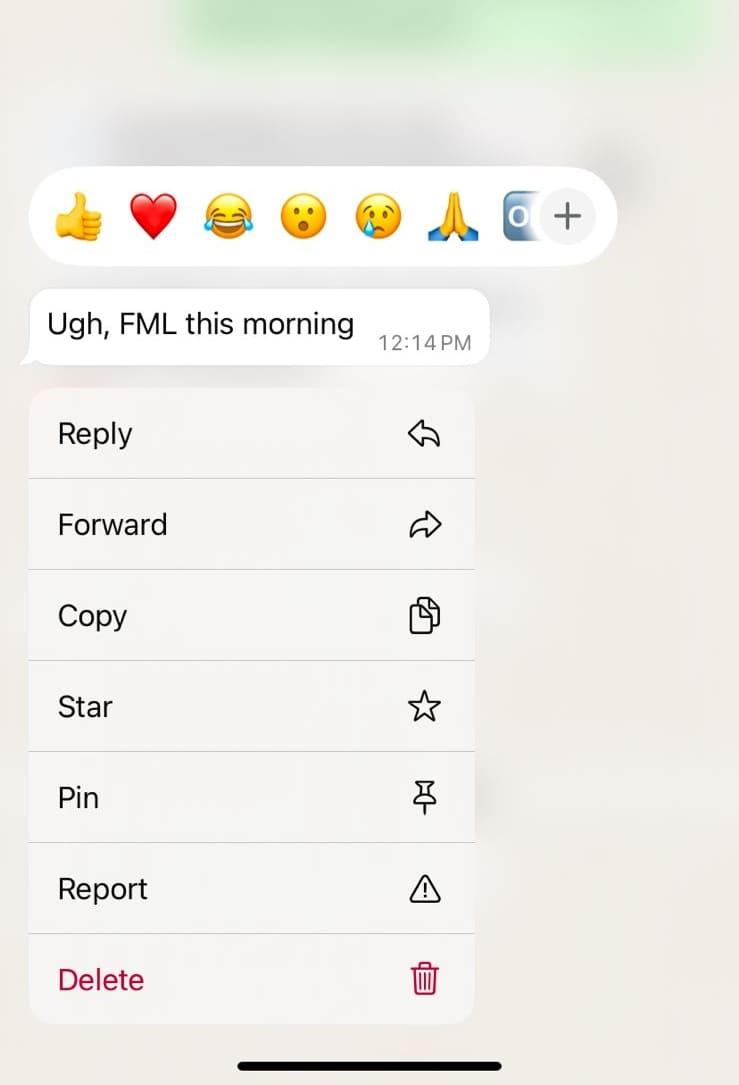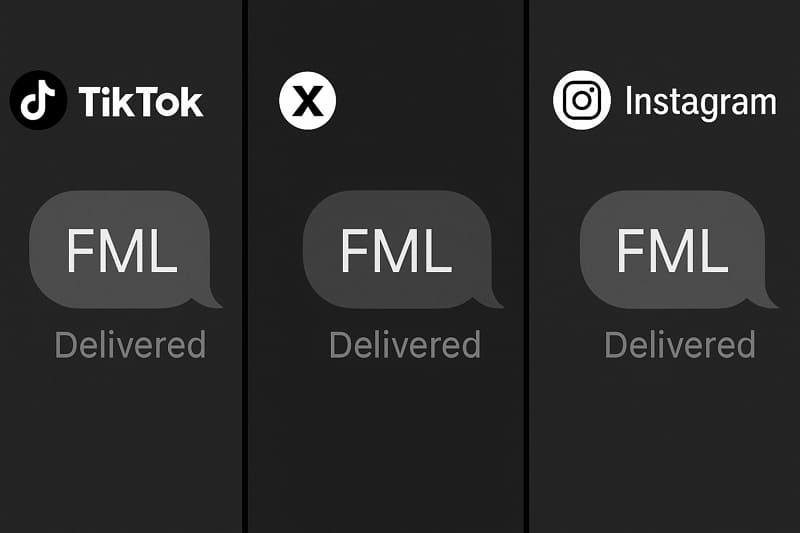Many teenagers today use abbreviated forms and slang in their online chats and posts. These expressions usually help them share their feelings quickly with friends. However, such terms can seem confusing or even alarming to parents. A typical example is the term "FML," which is often used in texts, captions, or casual online chats. Additionally, this term may seem shocking when parents first encounter it.
Although it sounds unkind, teens mostly use it to joke or express small daily stress. Still, it's essential to know the reasons why they use this kind of language with their friends. Thus, this dedicated article will help you learn the FML meaning, along with how parents talk to their teens about it. With this knowledge, you can better support your teens without disturbing their casual habits.

Table of Content
Part 1. FML Meaning in Text: What Parents Need to Know
The FML stands for "Fuck My Life" and is used mainly by teens online nowadays when they are upset. Many parents feel confused when they see such slang in their teens' messages or online posts. It appears in texts, social media, and chats across various platforms, including Facebook and private messaging apps. When you are asking, "What does FML mean in text?” it's usually just an emotional reaction.
Part 2. How Teens Use FML: Real Examples and Context
When you know the FML meaning in text, it’s helpful to see how teens use it. Thus, this section will look at real-time examples and situations to show when it’s casual talk and when it needs attention:
Real Usage Scenarios with Examples
- Bad Grades Frustration: A teenager can say 'FML' after failing a test she had tried hard to prepare for all week. Here, it's a quick way to express disappointment without meaning anything dangerous or severe at all.
- Late for School: When a girl oversleeps and misses her ride, she might message her friend saying, "Ugh, FML this morning." This indicates light stress, a common phrase used by teens when their day starts on a rough note.

- Broken Phone: In case a teen drops their phone, then they may post FML out of sudden stress and shock. It reflects how small incidents can feel overwhelming, especially when they are already under pressure.
- Plan Cancelled: If their friends cancel the plan at the last minute, they might also post this phrase to express sadness or anger. This is not alarming, but it feels like being ignored or left out at a moment that felt important.
- Feel Tired: The FML meaning from a girl can also come when she is tired from studying or office work and has no time to rest. In such cases, she might use the phrase to express emotional stress rather than a serious mental issue.
Harmless Frustration vs Serious Concerns
As explored, teens typically use this term to describe minor problems, such as poor grades or awkward situations at school. While most cases are harmless, sometimes it can point to deeper stress or emotional pressure they are facing quietly.
Therefore, knowing the FML slang meaning helps parents tell when something more serious might be happening. Additionally, examining patterns and tone can help them determine whether to speak up or intervene gently.
Platform Differences and Usage Patterns
Teens use this phrase in various ways depending on the app or platform they are primarily active on. On Instagram or TikTok, it actually appears in captions or text overlays to describe humorous or unfortunate moments. Alongside that, they even use hashtags like #FML on Twitter, known as X, to join larger communities or trends about daily struggles.

Reddit users share detailed stories using FML in specific discussion groups. Whereas, in text messages or private chats, it’s more personal and usually shared with close friends who understand the mood. Anyhow, exploring the FML meaning across different platforms helps parents know when it's playful and when it may be serious.
Part 3. Why Parents Should Care About FML Slang
Many parents ignore teen slang, thinking it's just a trend, but these words can show deeper emotions or stress. Below, we will explore a few points as to why you should care about the meaning of FML when your teens are involved in it:
- Reveals Emotional State: Such slang helps parents understand hidden feelings their child might not openly talk about or share.
- Builds Trust: When parents understand slang, teens feel more accepted and are likely to open up without fear or judgment.
- Detects Patterns: The repeated use of FML may indicate ongoing stress, making it easier for parents to recognize emotional patterns early.
- Wellness: Additionally, recognizing emotional cues helps parents identify signs of anxiety or sadness before they escalate into more serious or harmful issues.
- Safer Expression: Teens express better when parents listen without laughing, correcting, or reacting harshly to their choice of words.

Part 4. Talking to Your Teen About FML and Online Language
Many teens use slang without giving it much thought, but parents should still discuss openly what those words really mean. Thus, the following parts help parents start healthy conversations and recognize when slang use is normal:
1. Starting Conversations About Language Choices
You should gently ask about the words they use and what those words mean. Let your teen explain freely, and avoid interrupting or reacting with anger or strong judgment. Alongside that, you can ask your teen what FML means to build trust and make future conversations easier.

2. Setting Boundaries for Appropriate Expression
Help your teen understand when and where certain words are okay or not okay to use. Additionally, you should discuss respect in online spaces and what is acceptable in both public and private conversations with others. Explain that the FML meaning in the text may sound normal to friends, but it seems unethical or rude in other situations.
3. When to be Concerned vs When It’s Normal
Frequent use of such slang with signs of sadness or withdrawal may point to emotional stress that needs attention. Additionally, using it casually with friends to express minor issues or share jokes is a normal part of online teenage behavior. Parents can utilize monitoring tools like FamiSafe to monitor their teens' slang usage on their phones.
- Set Screen Time & App Rules
- Capture Instant or Scheduled Screenshots
- Web Filter & Safe Search
- Location Tracking & Driving Report
- App Blocker & App Activity Tracker
- YouTube History Monitor & Video Blocker
- Social Media Texts & Porn Images Alerts
- Available on Multiple Platforms
Conclusion
In conclusion, discovering the actual FML meaning helps parents understand their teens’ feelings and online routines. Since such slang is often considered immoral or unethical, it can sometimes reveal stress or things teens don’t say directly. At this point, parents can guide them by staying informed and setting clear limits. To make this easier, FamiSafe can help you monitor your kid's slang on their phone through messages or even calls.


